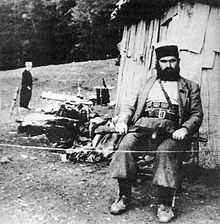Baba Faja Martaneshi
Baba Faja Martaneshi (born 1910 as Mustafa Xhani in Luz i Madh near Kavaja , Ottoman Empire ; died March 18, 1947 in Tirana ) was an Albanian spiritual leader (Baba) of the Bektashi order and a resistance leader during the Albanian National Liberation War People in World War II . He is considered the national hero of Albania (Hero i Popullit) .
Life
Baba Faja carried out intensive religious studies early on in order to enter the Tekke of Martanesh , where he also adopted the religious name under which he became known among the people.
After the Italian invasion of the Kingdom of Albania , he headed one of the first guerrilla organizations against the occupiers, branded fascist Italy as anti-Islamic and made contacts with the communist Albanian partisan movement. This made him one of the most wanted men in the country. In his memoirs, Enver Hoxha wrote that during the war the Baba was “one of those clerics who wore the cap and mantle of a dervish but held in their hearts Albania and their hands the guns for its liberation. ... [He] did not throw away his clerical cap and cloak, and he acted quite rightly because in this way he contributed even greater service to the line of the Party and the National Liberation Front to unite everyone regardless of region or political or religious views . " David Smiley describes Baba Faja as a lovable" Kanaille "who" delighted with singing partisan songs in his deep bass voice, especially after consuming large amounts of raki . "
He became a founding member of the National Liberation Front when it was established in September 1942 and served on its General Council together with Enver Hoxha, Myslym Peza and other resistance fighters. In July 1943 he became a member of the General Staff of the Albanian National Liberation Army . In May 1944 he became the vice-chairman of the Standing Committee of the Anti-Fascist National Liberation Council. After the war he was Elbasan's representative in the Constituent Assembly and later became Vice-Chairman of the Presidium of the People's Assembly.
During the war he asked Hoxha whether he would like to accept him into the Communist Party ; Hoxha supported this step and added: “I am sure that you do not believe in religion, but only in the party.” Then Baba said: “I will take off my clerical robes for the party.” To which Hoxha replied: “No, you should leave the robes you are wearing. This is not a question of deceiving people, but you wore these religious robes as a priest before the war and before the party was founded. So carry it on, because we must respect the feelings of the believers and use the sympathy of the people that the people have for you and the Tekke of Martanesh. So, since you are determined to go to war and love the party, respect and apply your line, we will accept you as a member of the party. ”He then became a party member.
In May 1945 he chaired the Fourth Congress of the Bektashi community, which severed ties between the Albanian Bektaschite and the rest of the Islamic world . As the most prominent personality of the Bektashites who worked with the communists, he led the so-called reformers within the community, who support that the “clergy” can marry, shave their beards and that wearing religious clothes should be limited to ceremonies. On March 18, 1947, the conservative leader of the community, Abas Hilmi , was confronted by Baba Faja and Baba Fejzo Dervishi (a like-minded “reformer”) who demanded that he accept their policies or otherwise threatened government reprisals. Hilmi then decided suicide to commit and accommodating to shoot both men.
Individual evidence
- ^ Robert Elsie: A Biographical Dictionary of Albanian History. London: IB Tauris. 2012. p. 298.
- ↑ Bernd J. Fischer: Albania at War, 1939–1945. West Lafayette, IN: Purdue University Press. 1999. Pages 111-112.
- ^ Enver Hoxha: Laying the Foundations of the New Albania. Tirana: 8 Nëntori Publishing House. 1984. Pages 77-78.
- ^ David Smiley: Albanian Assignment. London: Sphere Books. 1985. p. 84. The Bektashi sect does not prohibit alcohol consumption.
- ^ Owen Pearson: Albania in Occupation and War: From Fascism to Communism, 1940-1945. London: IB Tauris. 2005. pp. 205, 257-258.
- ^ Enver Hoxha: Laying the Foundations of the New Albania. Tirana: 8 Nëntori Publishing House. 1984. Pages 451-452.
- ^ Robert Elsie: A Biographical Dictionary of Albanian History. London: IB Tauris. 2012. p. 298.
- ^ Enver Hoxha: Laying the Foundations of the New Albania. Tirana: 8 Nëntori Publishing House. 1984. Pages 271-272.
- ↑ Oliver Jens Schmitt: Religion and Culture in Albanian-speaking Southeast Europe. Frankfurt am Main: Peter Lang. 2010. p. 168.
- ^ Robert Elsie: A Biographical Dictionary of Albanian History. London: IB Tauris. 2012. p. 298
- ↑ Oliver Jens Schmitt: Religion and Culture in Albanian-speaking Southeast Europe. Frankfurt am Main: Peter Lang. 2010. p. 168.
| personal data | |
|---|---|
| SURNAME | Martaneshi, Baba Faja |
| ALTERNATIVE NAMES | Xhani, Mustafa |
| BRIEF DESCRIPTION | Albanian resistance fighter and dervish of the Bektashi |
| DATE OF BIRTH | 1910 |
| PLACE OF BIRTH | Luz i Madh near Kavaja , Ottoman Empire |
| DATE OF DEATH | March 18, 1947 |
| Place of death | Tirana , People's Socialist Republic of Albania |
